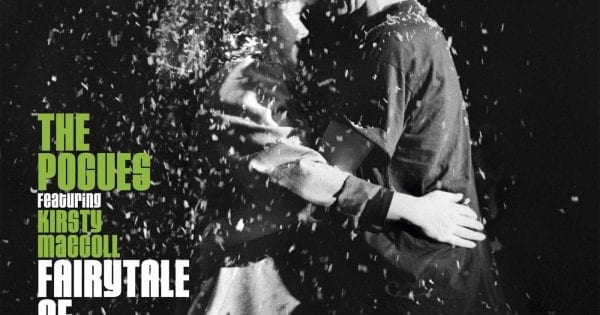

Of Pogues and Ponies and Possibilities for Christmas
The glimmer of racetrack redemption as told through a brilliant, drunken Christmas classic.
by Dave Briggs
Put aside, for a second, that the protagonist in the greatest Christmas song of the modern era ends up in the drunk tank on Christmas Eve. The fact he got on a lucky one at the racetrack that came in at 18-1 is what always catches me.
A major score, no matter how dire your situation, has the magic ability to fuel belief that anything is possible and dreams may yet come to fruition.
I’ve got a feeling
This year’s for me and you
So happy Christmas
I love you baby
I can see a better time
When all our dreams come true
We could all use that kind of optimism, as misguided as it appears to turn out in the end for Shane MacGowan’s character in Fairytale of New York, the 1988 song by MacGowan’s band of celtic punk godfathers, The Pogues, that is as brilliant as it is crushing.
MacGowan, who in real life has done little to dispel the stereotype of the drunken Irish poet that leads the pub in song and enjoys taking a flutter on the ponies, makes you believe every slurred syllable. Amazingly, he is still with us and should turn 59 on Christmas Day as he continues to buck the fact he’s the chalk in a lot of people’s rock star dead pools.
Born in England, MacGowan was raised in the family home in Tipperary that doubled as a safe house for the Irish Republican Army (IRA) during the Irish War of Independence. It is here MacGowan learned to embrace many vices at a young age.
“I was smoking and drinking and gambling before I could talk,” he told The Guardian newspaper in 2013.
MacGowan credits his Aunt Nora for his many fascinations.
“(She) combined gambling on the Irish sweepstakes with teaching me my catechism for my first Holy Communion. She was a religious maniac. And she liked a drink and she chain-smoked. We used to pray on every horse. And we used to win again and again and again. My first horse came in at 10-1 when I was five. And that is how I became a religious maniac and a total hedonist at the same time,” he said.
Religion is a constant theme in Pogues songs, but MacGowan also never lost that obsession with horse racing. He once wrote an entire ramshackle tune called Bottle of Smoke with fellow Pogue and Fairytale of New York co-writer Jem Finer that gloriously — and profanely — details cashing a huge bet at 25-1 on a horse named Bottle of Smoke that wins the Cheltenham Gold Cup.
I had the Bottle of Smoke
Slip a fifty to the wife
And for each brat a crisp new five
To give me a break on a Saturday night
When I had the Bottle of Smoke
A true wordsmith and punter, MacGowan astutely noted later that Bottle of Smoke was “the sort of weird impossible name that always wins a race.”
(You can listen to Bottle of Smoke here and because MacGowan is notoriously difficult to understand, you can read his lyrics here, but be warned the tune is laced with f-bombs)
Similarly, Fairytale of New York is no schmaltzy, diabetes-inducing Christmas ditty you play for your kids — thinking of you Andy Williams. It is a catchy, gritty and heart-tearing duet between MacGowan and Kristy MacColl that tells the fictional tale of their ill-fated love affair.
Musically, it builds from a crestfallen piano in keeping with his predicament, into a swelling celtic soundscape that augments both the couple’s flashback of better days and the promise of Utopia awaiting Irish immigrants in America. The lyrics are concise and powerful — a complete literary narrative of dreams dreamed and dashed told in little more than what it takes to race a couple of miles.
The good days begin promising enough. When he first takes her hand on a cold Christmas Eve, he promised that Broadway was waiting for her. They kissed on the corner and danced through the night to Frank Sinatra until the bells began to ring and the fictional NYPD Choir bursts into an old Irish pub song on Christmas morning. Fast forward and the relationship has dissolved into addiction, acrimony and insults — including a needle-scratching slur some in Ireland insist is a word they use for lazy people, not homosexuals. As their lives fall apart in spectacular fashion, she accuses him of the biggest crime of all — robbing her of her dreams.
“I could have been someone,” he insists.
“Well so could anyone,” she fires back.
It’s a killer line to be sure, but he insists he always put her dreams with his and built his life around her. Despite the collapse of his life and hers, he still harbors hope, as any good bettor should.
So — to steal from another bleak Christmas tune — this is Christmas? Well, certainly not the Christmas imagined by Coca Cola, but one some of us can, sadly, recognize.
At the very least, like watching the latest reality TV train wreck, Fairytale of New York can make you feel a lot better about your own life. That kind of appreciation for one’s blessings isn’t a bad message at Christmas. Neither is the song’s glimmer of redemption that happens to come at the racetrack just in time for Christmas. Sure, he drank away the winnings, but luck is always just around the corner.
I wouldn’t necessarily bet on it, but maybe, just maybe, it will work out in the end.
The boys of the NYPD choir
Still singing “Galway Bay”
And the bells are ringing out
For Christmas day















